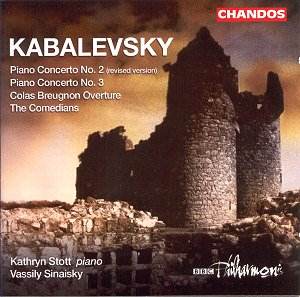Outside the USSR Kabalevskyís music has met with condemnation
or condescension. He has a ready knack for melodies and rhythms
of instant catchy appeal. No wonder a generation or three of music
critics have chosen to slate his stuff. Those who choose to mix
politics and music also find time for a swipe that mixes outrage
at dogma with judgement on musical merit. I am not making any
claims to greatness or depth for this music but I will take a
little time to tell you about its many appealing qualities. If
we can listen to Coates, Gillis, Rutter and Respighi and also
accept the lighter works of Tchaikovsky, Walton, Barber, Bax,
Shostakovich and Arnold, why is it that we have such difficulty
with Kabalevsky? It is not, horror of horrors, that he wrote only
music that is shallow but captivating. For example there are satisfying
ambiguities and challenging depths in both his Second Cello Concerto
(listen to the Shafran performance on Cello Classics CC1008 and
Wallfisch on Chandos) and the Requiem (Olympia OCD290, with Symphony
No. 4). I am sure that ideology has more to do with his standing
than anything else.
The Overture is utterly unsubtle: blasted with
colour and driven by the sort of energy that rips through Shostakovichís
Festival Overture. Colas is a sort of Soviet echo
of a lost generation of overtures: Reznicekís Donna Diana,
Smetanaís Bartered Bride and Charbrierís España.
The complete opera Colas Breugnon is on Olympia OCD291
conducted by Georgy Zhemchuzhin. After a pocket overture we get
a pocket concerto. The piano sound is cosseted; rather warmly
recorded. I would have preferred a greater clarity or coldness.
The work perhaps formed a subliminal model for Shostakovich when
he came to write his own great populist piano concerto (No. 2)
twenty-five years later. This work is certainly fun if at times
relentless; the nature of the beast. In the second movements there
are troubled aspirations towards profundity but Kabalevsky returns
to type for the hectic and thunderous rush of the finale. The
Third Concerto (once wonderfully carried off on Supraphon by Frantisek
Maxian) has a really cracking tune. The sound is not at all congested
and the piece is very well orchestrated. Kabalevsky dallies with
a Hispanic-accented theme but the finale with its fun-at-the-sprint
returns to the first movementís grand nostalgic theme. Glorious
stuff! The suite from The Comedians is as bright as a polished
Soviet star. This is circus frivolity without the macabre element
you might have found if Shostakovich had taken this on. Prokofievís
Peter and the Wolf is a strong presence in track 7.
Complete with good liner notes this is a fun
disc - not too profound - for those prepared to loosen their strait-lacing.
Rob Barnett
